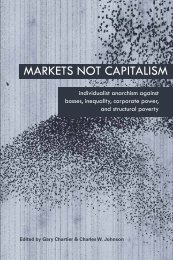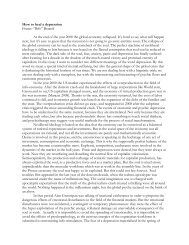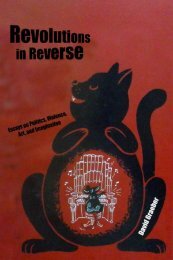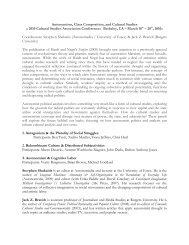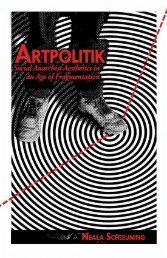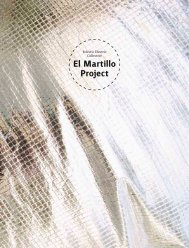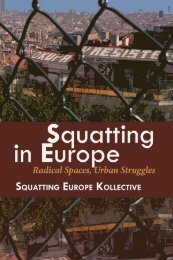nanopolitics handbook - Minor Compositions
nanopolitics handbook - Minor Compositions
nanopolitics handbook - Minor Compositions
Create successful ePaper yourself
Turn your PDF publications into a flip-book with our unique Google optimized e-Paper software.
make this possible, the alternatives are hardly enticing: lonely and miserableways of ageing in the absence of proper welfare, pensions, public spaces andinstitutions, or the nuclear family that functions as an enclosed unit withinthe capitalist economy.Neither the family where daddy goes to work, nor the one where mummyhas three jobs and yet no access to benefits. The promise of transforming‘work’ towards something more meaningful and self-organised than wage labouris a fruit of the network form, which we may have much more to reapfrom if we engage it not only from the perspective of autonomy but also ofreproduction. The promise of freeing housework from its dark life-long kitchensis just as important as that of loosening the grip of the wage (and its inverse,unemployment) if we’re to struggle for desirable ways of integrating lifeand work. Built into our practice of autonomy needs to be an understandingof heteronomy, of how we depend on each other rather than just needing tobe radically ‘free’. Not the family as ‘infantile abandon to a fuzzy dependency,where everything is familiar, this carefree moment in the face of a world thatnobody can deny is breaking down’ 15 , but militant network-families as spacesfor thinking heteronomy and autonomy together.Endnotes1. Pascale Molinier, Sandra Laugier, et al. (2009). Qu’est-ce que le care ? souci des autres,sensibilité, responsabilité. Paris, Payot. p.39. My translation2. This text draws on research and interviews I recently did in the framework of my Phd thesis:Collective practices between Creativity and Care, Queen Mary University London, forthcoming.More information as well as some of the present interviews are available at futurearchive.org/static/carenetworks.html Also, in relation to movement contexts, see the research projecton ‘Radical Collecive Care Practices’ as initiated by some <strong>nanopolitics</strong> people in Vienna radicalcollectivecare.blogspot.com.As well as the special show on ‘Other family politics’ of the ‘soundsof movement’ radio programme soundsofmovement.noblogs.org3. Federici, Silvia (2012), Panel Presentation at Historical Materialism Conference, London.Video: youtube.com/watch?v=TARD7LZouS8&feature=youtu.be4. As some groups of the 15M movement have echoed a LGBT slogan: ‘la familia nuclear esradioactiva’, theme of an event on 27 th may 2012. See tomalafamilia.wordpress.com5. A nice article book to download and look at is this one: Raquel Mezquita and MagaritaPadilla (2006), ‘Penelope: Tejiendo y destejiendo la red’, in: Ciberactivismo: sobre usos politicos ysociales de la red. Barcelona: Virus Editions. viruseditorial.net/pdf/ciberactivismo.pdf6. Interview with Marga, Madrid, October 2011 futurearchive.org/movies/597. Maurizio Lazzarato (2011). La Fabrique de L’homme endetté, Paris: Editions Amsterdam.p.12. My translation. p.558. Although we certainly do, and preferably through a lens of feminist economics, ecologicaland indigenous movements and a basic income.9. Maurizio Lazzarato (2011), La Fabrique de L’homme endetté, Paris: Editions Amsterdam.p.45194



